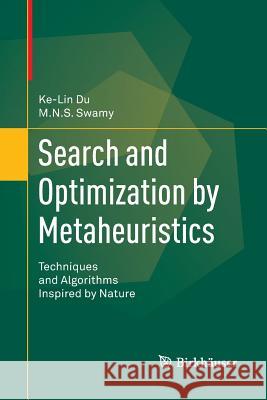Search and Optimization by Metaheuristics: Techniques and Algorithms Inspired by Nature » książka
topmenu
Search and Optimization by Metaheuristics: Techniques and Algorithms Inspired by Nature
ISBN-13: 9783319822907 / Angielski / Miękka / 2018 / 434 str.
Kategorie:
Kategorie BISAC:
Wydawca:
Birkhauser
Język:
Angielski
ISBN-13:
9783319822907
Rok wydania:
2018
Wydanie:
Softcover Repri
Ilość stron:
434
Waga:
0.63 kg
Wymiary:
23.39 x 15.6 x 2.36
Oprawa:
Miękka
Wolumenów:
01
Dodatkowe informacje:
Wydanie ilustrowane











